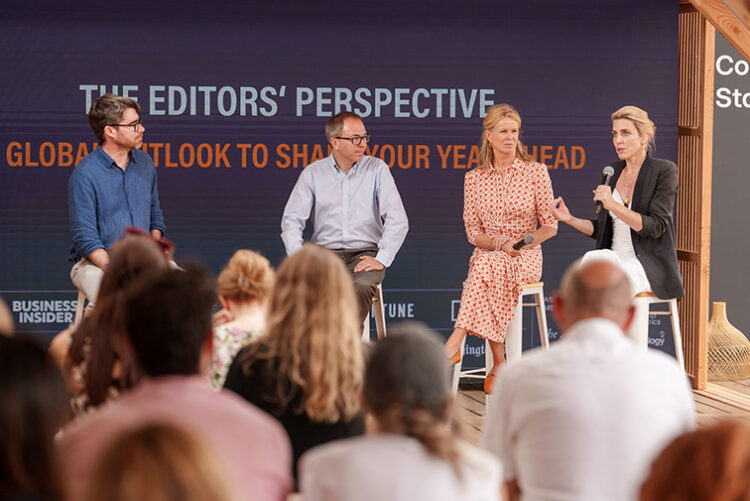Why news remains high on the agenda

Opinion
Cannes Lions 2024 marked a turning point in how brands, agencies and industry bodies view the importance of quality journalism and why advertisers need to support it. But we can do more.
Every year, prevailing themes emerge from Cannes Lions as brands, agencies, tech companies, platforms and media gather to do business, explore new ways of working and celebrate the best our industry has to offer.
Of course, AI featured heavily on the agenda at this Cannes Lions, but I was surprised by how much time was devoted to talking about news and specifically how and why advertisers should commit to funding news through aligning with and supporting quality journalism.
This is something that CNN and other news publishers have been saying for many years but, for me, this year’s Cannes Lions marked a real uptick in how brands, agencies and industry bodies all wanted to have this discussion.
So, why now?
It’s no coincidence that we are in the midst of a busy news cycle. News organisations are investing heavily to deploy journalists to the front line to report on long-running conflicts in Europe and the Middle East, cover developing political issues in the “year of elections” and provide expert analysis on what these seismic developments mean for ordinary people and the world at large.
This coverage helps people understand the world, informs their decisions and, crucially, combats the spread of disinformation.
While all this news-gathering and programming requires significant resource and generates significant audiences, it can’t be easily described as “advertiser-friendly” in the traditional sense. As news publishers, we have focused on deploying smart technology so that advertisers can be confident their brand doesn’t appear in an inappropriate context while at the same time optimising the campaign to reach the target audience at the right time and in the right place for maximum impact.
We also see success in building branded verticals and multiplatform franchises in areas such as travel, business, style and tech that appeal to audiences and advertisers alike.
Debunking myths
But this isn’t enough. Not until, at least, advertisers truly appreciate the wider importance of funding news — or we, as media owners, do a better job of communicating the benefits that news brings not just to advertisers but to societies and democracy as a whole.
The good news is that there is plenty of data to debunk the myth that advertising around news causes brand reputational issues.
At the NewFronts in New York earlier this year, the IAB referred to consumer research that showed 69% of people say there is no negative effect on how they perceive a brand when they see it advertising next to “disconcerting news”.
Similarly, Stagwell’s Future of News study provides further evidence for both audience appetite for news (73% of US audiences follow news closely) and positive consumer perception of brands that advertise around news.
As part of this research, 10 brand ads were placed adjacent to eight types of news content, using real ads and real stories. The results show comparable high brand reputational metric scores (67% vs 68%) for how ads performed next to hard news stories about US politics, conflict, crime and inflation compared with ads next to “brand-safe” content of business, sports and entertainment news.
At CNN, we have research that further demonstrates the positive impact of brands being around news. We know from our own newly released Business Decision Makers’ Mindset study that global business leaders place particularly high value on news, with 94% saying international news is important for informing business decisions. And we have new research to be released in the coming months that shows eight out of 10 senior marketers are confident that the news environment is brand-safe.
Education for the industry
So where does the disconnect lie if consumers don’t have a negative perception of brands around news, business leaders turn to news to inform decisions, marketers consider news brand-safe, but continually news content falls foul of blocklists or is left off media plans?
The answer must be in education — for brands and agency buyers, but also for publishers. Because a thriving news ecosystem is in all of our interests, both for doing business and also because trusted and factual journalism is vital for informing people, holding power to account and underpinning democracy.
This year’s Cannes Lions event gives me hope that there is progress in this area. In the past, publishers have spoken about this topic mainly independently, but on the Croisette this year I saw the BBC, Business Insider, CNN, The Economist, The Wall Street Journal and The New York Times, among others, set aside their competitive tendencies to come together to talk about this topic with a united voice on a number of panels.
I saw many agencies champion supporting news. I had really good conversations with many CNN partners and other brands about their respect for news and what it can do for their brands. And I saw the work being done by organisations like the World Media Group to bring this conversation to the fore and help build alliances across the industry.
These may be just words in Cannes but, when supported by action, these conversations can speak to a greater purpose where advertisers, agencies and news publishers can work together towards a goal that combines generating impact and return on investment for brands while at the same time supporting an ecosystem that benefits all of society.
 Cathy Ibal is senior vice-president at CNN International Commercial
Cathy Ibal is senior vice-president at CNN International Commercial



